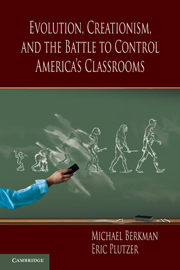Book contents
- Frontmatter
- Contents
- Figures
- Tables
- Acknowledgments
- Introduction
- 1 Who Should Decide What Children Are Taught?
- 2 The Public Speaks: “Teach Both”
- 3 A Nation Divided by Religion, Education, and Place
- 4 Is Evolution Fit for Polite Company? Science Standards in the American States
- 5 Teachers and What They Teach
- 6 State Standards Meet Street-Level Bureaucracy
- 7 When the Personal Becomes Pedagogical
- 8 Teachers in Their Schools and Communities
- 9 The Battle for America’s Classrooms
- Appendix to Chapter 2
- Appendix to Chapter 3
- Appendix to Chapter 4
- Appendix to Chapter 5
- Appendix to Chapter 6
- References
- Judicial Opinions and Court Cases Cited
- Index
1 - Who Should Decide What Children Are Taught?
Published online by Cambridge University Press: 05 June 2012
- Frontmatter
- Contents
- Figures
- Tables
- Acknowledgments
- Introduction
- 1 Who Should Decide What Children Are Taught?
- 2 The Public Speaks: “Teach Both”
- 3 A Nation Divided by Religion, Education, and Place
- 4 Is Evolution Fit for Polite Company? Science Standards in the American States
- 5 Teachers and What They Teach
- 6 State Standards Meet Street-Level Bureaucracy
- 7 When the Personal Becomes Pedagogical
- 8 Teachers in Their Schools and Communities
- 9 The Battle for America’s Classrooms
- Appendix to Chapter 2
- Appendix to Chapter 3
- Appendix to Chapter 4
- Appendix to Chapter 5
- Appendix to Chapter 6
- References
- Judicial Opinions and Court Cases Cited
- Index
Summary
Teachers in public schools must teach what the taxpayers desire taught.
William Jennings Bryan (1924)The people have spoken on this subject and have shown by an overwhelming vote that they do not want their children taught the theory of evolution in the public schools.
Bruce Bennett, prosecutor in Epperson v. Arkansas (1968). Susan Epperson sought to teach evolution in Little Rock in violation of Arkansas state law.The people of Louisiana…are quite entitled…to have whatever scientific evidence there may be against evolution presented in their schools…
Antonin Scalia in dissent in Edwards v. Aguillard (1987). Don Aguillard was a high school teacher who challenged a Louisiana law that required the teaching of Creation Science along with evolution.To refer the students to “Of Pandas and People” as if it is a scientific resource breaches my ethical obligation to provide them with scientific knowledge that is supported by recognized scientific proof or theory.
High school science teachers in Dover, PA, in response to a district requirement that they read a statement promoting an Intelligent Design textbook as an alternative to Evolution (2005).John Thomas Scopes, a twenty-four-year-old football coach and general science teacher in Dayton, Tennessee, is the often forgotten figure in the 1925 Scopes “monkey trial,” dominated as it was by the expansive personalities of William Jennings Bryan, Clarence Darrow, and H. L. Mencken. Recruited by local businessmen interested in generating attention for Dayton, Scopes acknowledged using a text – one used by most science teachers in Tennessee – that taught human evolution in contradiction to the biblical account in Genesis, a violation of Tennessee's recently passed Butler Act. Scopes soon found himself in the middle of one of the most closely watched trials in U.S. history. Radio station WGN of Chicago broadcast the trial live each day, and all of the nation's major newspapers sent reporters to Dayton, with many printing verbatim transcripts of the trial. Syndicated columnist H. L. Mencken made daily reports that were published in scores of newspapers.
Scopes’ jury trial in Dayton and his appeal to the Tennessee Supreme Court were dominated by three different debates: one substantive, one procedural, and one concerning the autonomy of teachers in their classrooms. The substantive debate is one familiar to Americans today: How compelling is the scientific evidence for a very old earth, evolution in general, and the evolution of human beings in particular? In addition, if the evidence for evolution were strong, would this contradict the teachings of the Bible? These questions came to the fore when William Jennings Bryan took the stand for four hours and debated questions of biblical interpretation and human origins with defense attorney Clarence Darrow.
- Type
- Chapter
- Information
- Publisher: Cambridge University PressPrint publication year: 2010



